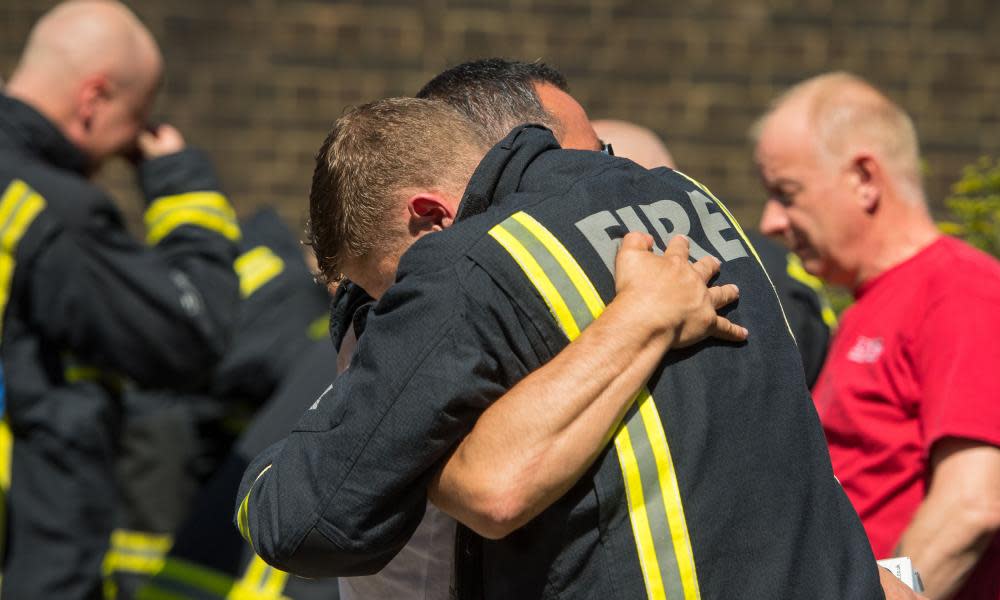With the government in paralysis, and fear, anger and grief everywhere, it feels explosive | Suzanne Moore

The helicopters are very near again. Circling, searching, their noise almost a constant these days. I am sleepless because of the heat, because of the helicopters. It is better not to know what they are doing as it will only be terrible news. The other night it was because of the attack near Finsbury Park mosque. Last, there were riots in Stamford Hill, north London. Kids with machetes some said, and knives found after a stabbing.
I can’t think about this, I decide. These multiple blows to the place where my children and I live. It is not OK. It can no longer be processed as just “city living”. First the killing of little girls and pop fans in Manchester. And now the fire, this awful fire, looms over everything. Because it was preventable and because it was allowed to happen and because living in a vibrant or diverse city – or whichever estate agent phraseology we use – means a kind of cognitive dissonance, whereby many simply do not “see” the people they live beside. To some extent, it’s protection. To encounter the reality of those we live beside is shaming because the level of inequality is shaming. It is one thing to “know” this, another to feel it.
But something has ruptured and, post-Grenfell, it is not possible to carry on. There is no unseeing the faces of the missing and the dead. There is no unhearing those last messages.
There is also no denying the urge to help. Those with least always give most. The bags of clothes that will never be needed remind me of what I saw in the camps around Calais. Small girls’ frocks when thick men’s jackets were needed. Clothes that are worse for wear dumped because – hey! – these folks now have nothing so they’ll wear anything. But are the survivors of Grenfell really expected to wear cast-offs and be treated as folk in need of a charity single? What does this say about their status?
Visiting friends, we decide not to talk about the fire … and then we talk about it. Telling tales of two cities indeed. I remember a BBC documentary from 10 years ago, The Tower, about Lewisham. Posh people were moving into a gentrified tower block. The secret, said a property developer, was for the clients to really believe that the area they were moving to was changing. Well-heeled couples went “ooh” and “aah” over their breakfasts; those views, that fantastic light. High-rise living was reinvented as glamorous.
Actually, I lived in a council tower block where the lifts were always stuck. And I had to be rescued by the fire brigade when I was very pregnant. It wasn’t very glamorous. I also experienced a fire in another council property where the fire extinguishers were empty and I became homeless as a result. These events were nothing compared with what happened last week, but it replays in my head: the moment when a fire becomes something you cannot control. The wall of smoke. The firefighters crawling in and smashing out the windows. My flat entirely blackened, with the twisted shape of a melted fridge. The anxiety never leaves you once you have been in a fire. A flickering candle in your peripheral vision can set off panic.
One way to deal with anxiety is to imagine the worst that can happen and tell yourself it probably isn’t going to. But Grenfell is the worst thing that can happen, and it has happened. What appears to be beyond the imagination of some is not the deaths of those poor people but their lives. The “othering” of the black, the Muslim, the poor and those of uncertain immigration status has been a consistent project. It is ongoing. We are told that Finsbury Park suspect Darren Osborne wasn’t racist. We are told that Grenfell is not political. Former EDL leader Tommy Robinson is deemed a suitable guest for the pantomime of breakfast TV.
Such denial is shocking. But this disavowal of the truth is the modus operandi of this “government” and its fellow travellers. It’s all there in the dark hollows of May’s face, in the sweat on David Davis’s forehead. They are not in control. They are not even very good at giving a performance of being in control. Power ebbs away from them at every point. The unpreparedness for Brexit, the scrabbling for a deal with the despicable DUP.
The space that is deemed proper “politics” is shrinking in its mix of ego and delusion. Another, bigger space has opened up that is a rejection of so much of what has gone before and is being flooded with the energy of those who believe that everything really can be different. This is Jeremy Corbyn’s victory, this recapture. But there is a long way to go. There are already murmurs about whether capitalism can “afford” any policy that involves redistribution, and therefore democracy is dispensable. Such thinking is in play from the hard right and we must fear it as much as riots.
Fear, anger and grief are everywhere and, with a government in paralysis, this feels combustible. This is the most uncertain of landscapes. Having failed so visibly, to ask how we might take care of each other is a political question that goes far beyond an expression of empathy. It means acknowledging our own vulnerability. Those in charge feigning strong and stable leadership are anything but. Their authority is as solid as ash and, as it crumbles before our eyes, we hear the sirens.

 Yahoo News
Yahoo News 
